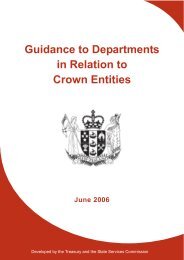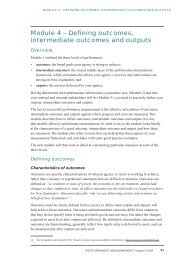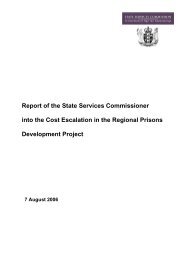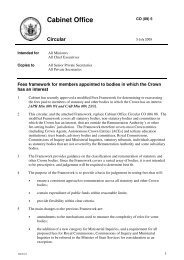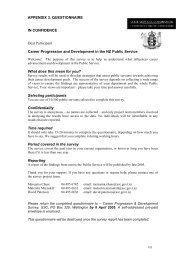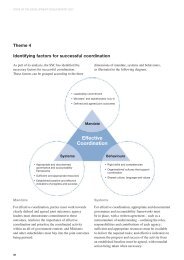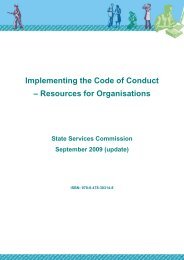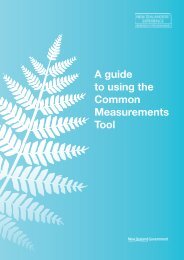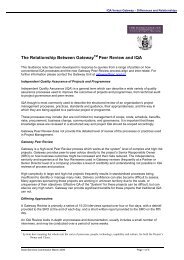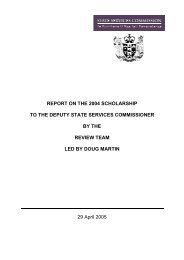Memo to State sector chief executives re re-employment after ...
Memo to State sector chief executives re re-employment after ...
Memo to State sector chief executives re re-employment after ...
You also want an ePaper? Increase the reach of your titles
YUMPU automatically turns print PDFs into web optimized ePapers that Google loves.
In these situations, a single inflexible approach will not necessarily meet the justice of every<br />
situation and employers will need <strong>to</strong> exercise sound judgement. Employees who <strong>re</strong>ceive<br />
<strong>re</strong>dundancy compensation in good faith and who have not obtained an offer of <strong>employment</strong><br />
have no certainty (even if they have begun <strong>to</strong> apply for other positions during the notice period)<br />
that they have another position <strong>to</strong> go <strong>to</strong>, and suffer a loss of continuity in <strong>employment</strong>. Such<br />
employees will have properly <strong>re</strong>ceived <strong>re</strong>dundancy compensation and will often use the<br />
compensation <strong>to</strong> protect their position.<br />
Whe<strong>re</strong>, however, an employee <strong>re</strong>ceives a job shortly <strong>after</strong> <strong>re</strong>ceiving <strong>re</strong>dundancy compensation<br />
the following may help <strong>to</strong> shape your thinking and <strong>to</strong> ensu<strong>re</strong> that the decision <strong>to</strong> make or not<br />
make an appointment in these circumstances is robust and defendable.<br />
SSC guidance on <strong>re</strong>-<strong>employment</strong> post <strong>re</strong>dundancy:<br />
<br />
<br />
The SSC expects Chief Executives <strong>to</strong> ensu<strong>re</strong> that good candidates a<strong>re</strong> not bar<strong>re</strong>d from <strong>re</strong><strong>employment</strong><br />
because they have <strong>re</strong>ceived compensation for a <strong>re</strong>cent loss of <strong>employment</strong>,<br />
but the decision <strong>to</strong> proceed with an <strong>employment</strong> offer must be balanced against the<br />
questions of fairness <strong>to</strong> the taxpayer and <strong>re</strong>sponsible use of <strong>re</strong>sources.<br />
If you a<strong>re</strong> considering offering <strong>employment</strong> <strong>to</strong> someone <strong>re</strong>cently made <strong>re</strong>dundant, on<br />
similar or better terms and conditions than they p<strong>re</strong>viously enjoyed in the <strong>State</strong> sec<strong>to</strong>r, we<br />
would advise you <strong>to</strong> consider all <strong>re</strong>levant fac<strong>to</strong>rs and <strong>to</strong> look for possible options that<br />
avoid “double dipping”. While the<strong>re</strong> is a legal obligation <strong>to</strong> <strong>re</strong>cruit the person best suited<br />
<strong>to</strong> the position, if the time elapsed since the employee left their p<strong>re</strong>vious role is short you<br />
might consider ag<strong>re</strong>eing some arrangement with the employee like deferring the<br />
appointment if this is feasible or for the applicant <strong>to</strong> <strong>re</strong>pay part of the compensation <strong>to</strong> the<br />
former <strong>State</strong> sec<strong>to</strong>r employer. The mo<strong>re</strong> senior the position the mo<strong>re</strong> appropriate such an<br />
arrangement may be.<br />
We a<strong>re</strong> NOT advocating that anyone made <strong>re</strong>dundant should not be <strong>re</strong>-employed, but rather<br />
that the taxpayer should not pay twice for the same period of time.<br />
Best practice in both the private and public sec<strong>to</strong>rs is for <strong>re</strong>dundancy compensation <strong>to</strong> be a<br />
capped entitlement, sometimes based on cur<strong>re</strong>nt service, but becoming less so. We note that<br />
some entitlements cur<strong>re</strong>ntly provide for <strong>re</strong>dundancy payments based in part on an employee’s<br />
family status - that may be discrimina<strong>to</strong>ry.<br />
However, in considering any approach <strong>to</strong> this matter you must always pay due <strong>re</strong>gard <strong>to</strong> the<br />
applicable <strong>employment</strong> ag<strong>re</strong>ement and any other specific legal <strong>re</strong>qui<strong>re</strong>ments.<br />
The SSC <strong>employment</strong> <strong>re</strong>lations advisors a<strong>re</strong> available <strong>to</strong> provide advice and support <strong>to</strong><br />
agencies in this a<strong>re</strong>a if <strong>re</strong>qui<strong>re</strong>d.<br />
<strong>Memo</strong> <strong>to</strong> <strong>State</strong> Sec<strong>to</strong>r CEs <strong>re</strong> Re-<strong>employment</strong> <strong>after</strong> Redundancy 11-02-11 (2).DOC 2



